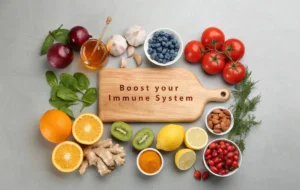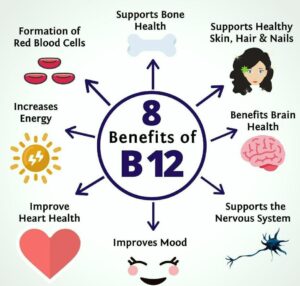Stay up-to-date on recommended vaccinations!
A strong immune system means taking advantage of the best leg up we have to protect ourselves from harmful illnesses: vaccines.
Your immune system protects you, but vaccines help it protect you even more! Helping it learn how to recognise and fight off certain disease-causing illnesses. It’s much safer for your immune system to learn via vaccination than through infection with harmful germs.
“It’s always important to be up-to-date on recommended vaccinations, especially your Covid-19 vaccine or booster as well as your annual flu jab” says Conor (our resident Pharmacist).
Did you know we offer Covid-19 and Flu jabs privately for those not eligible on the NHS? You can also have them at the same time!
Eat healthy to be healthy!
As with most things in your body, a healthy diet is key to a strong immune system. This means making sure you eat plenty of vegetables, fruits, whole grains, lean proteins and healthy fats.
“You should prioritise foods rich in the Vitamins and Minerals needed to support your immune system” says Conor.
- Vitamin B6, found in chicken, salmon, tuna, bananas, green vegetables and potatoes.
- Vitamin C, found in citrus fruit, including oranges and strawberries, as well as tomatoes, broccoli and spinach.
- Vitamin E, found in almonds, sunflower oil, sunflower seeds, peanut butter and spinach.
- Zinc, found in oysters, red meat, poultry, beans and dairy products.
- Magnesium, found in whole wheat products, nuts and seeds.

Exercise!
Physical activity isn’t just for building muscles and helping yourself de-stress; it’s also an important part of being healthy and supporting a healthy immune system. Try to incorporate 390 minutes of physical activity into your day.
Hydrate, hydrate, hydrate.
Water plays many important roles in your body, including supporting your immune system.
Even if you’re not exercising or sweating, you’re constantly losing water through your breath, as well as through your urine and bowel movements. To help support your immune system, be sure you’re replacing the water you lose with water you can use.
Rest and getting those zzz’s.
Sleep certainly doesn’t feel like an active process, but there are plenty of important things happening in your body when you’re not awake.
To give your immune system the best chance to fight off infection and illness, it’s important to know how much sleep you should be getting every night, as well as the steps to take if your sleep is suffering.
Stress? No thank you.
Whether it comes on quickly or builds over time, it’s important to understand how chronic stress affects your health.
Stress can potentially have a secondary impact on how well your immune system functions if it leads to sleep disturbances, a tendency to eat less healthy food, reduced water intake, less frequent exercise and more.
Stress is different for everyone, and how we relieve it is, too. Given the effect it can have on your health, it’s important to know how to identify stress. And, whether it’s deep breathing, mediation, prayer or exercise, you should also get familiar with the activities that help you reduce stress.
Supplements.
Vitamins and minerals are nutrients your body needs in small amounts to work properly and stay healthy.
Most people should get all the nutrients they need by having a varied and balanced diet, although some people may need to take extra supplements.
You can purchase over the counter supplements at your local supermarket or pharmacy. We can offer Vitamin B12 injections for you here at The Bank of Wellbeing! We can also offer blood testing to check your Vitamin and Mineral levels to ensure your body is working as it should!
